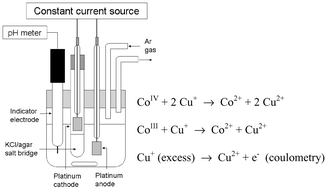We have evaluated the possible redox chemical methods for precisely determining the oxygen content in complex cobalt oxides that are being studied increasingly for their interesting electric and magnetic properties. For the evaluation, BaNdCo2O5 +
δ and Sr2(Ca,Y)Co2O6 +
δ phases are selected as reference materials to elucidate the capabilities of the different analysis methods. Two redox methods so far commonly applied, i.e. thermogravimetric H2 reduction and iodometric titration, are tested and two other, as yet unapplied, methods, i.e. cerimetric titration and Cu+/Cu2+ coulometric titration, are introduced for the analysis of functional cobalt oxides. The three different titration methods are found to reveal consistent values for the oxygen content with good reproducibility. The results of thermogravimetric
H2 reduction analysis agree with the titration results but show a wider scattering. Of the four analytical methods, the Cu+/Cu2+ coulometric titration method is considered most recommendable, since it is precise and may, furthermore, be applied to e.g. Cu and Fe substituted cobalt oxide samples.

You have access to this article
 Please wait while we load your content...
Something went wrong. Try again?
Please wait while we load your content...
Something went wrong. Try again?


 Please wait while we load your content...
Please wait while we load your content...